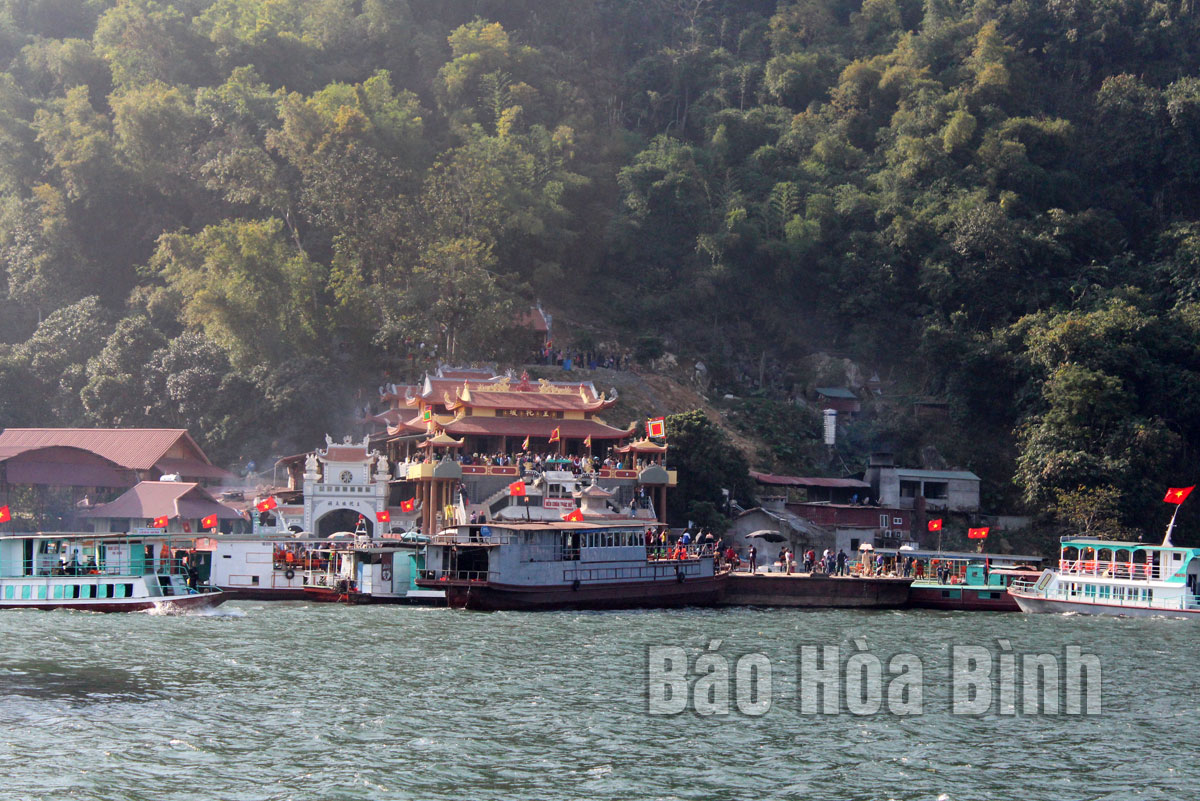
(HBO) - Da Bac district has majestic natural landscapes and is home to five ethnic groups namely Muong, Tay, Dao, Kinh and Thai. Each group has its own unique cultural identities that have created peaceful and beautiful villages which are favourable for developing community-based cultural tourism.
Thac Bo Temple, a famous spiritual tourist destination,
attracts tens of thousands of tourists every year.
The district is home to Pu Canh Nature Reserve with the highest peak of Hoa
Binh (1,373 m), along with many beautiful mountains, caves and waterfalls,
creating charming landscapes such as Lo Lan Cave, Ke Stream and Hien Luong Bay
in Hien Luong commune.
There are three national historical sites in the locality, along with Thac Bo
temple which has been recognised as a provincial cultural and historical relic.
Over the past years, the district has developed four community-based tourism
sites in Hien Luong and Tien Phong communes because these places still preserve
unique cultural identities in terms of customs, housing architecture, costumes,
cuisine, folk songs and dances, traditional musical instruments and festivals.
With a unique way of doing tourism, for a long time, Cao Son commune’s Sung
hamlet, where more than 70 households of Dao Tien ethnic group reside, is a
favourite destination of foreign tourists. Visitors are attracted by the beauty
of Bieu mountain, Sung cave, and hundreds of years old Shan Tuyet tea hill.
It can be said that with the advantage of beautiful natural landscapes, cool
climate, unique cultural identities and cuisine, Da Bac has a lot of potential
to develop high-quality tourism, attracting domestic and international
tourists.
To fully exploit this potential, the district’s Party Committee and People's
Committee have issued many important documents, including Resolution No. 09-NQ/HU,
dated February 6, 2015 on the tourism development of Da Bac district for the
2015-2020 period with orientations to 2030 and a tourism development project to
2020 with a vision to 2030.
The local administration has set the goal of mobilising investment
resources to develop tourism in a synchronous, professional and modern manner,
contributing to economic restructuring, creating more jobs, improving people's
living standards, promoting cultural values as well as protecting the
environment.
The district has implemented many solutions for tourism development,
prioritising capital for key tourism projects and infrastructure systems. It
has also encouraged and created favourable conditions for investors, solving
difficulties for businesses, especially related to site clearance and project
appraisal.
The promotion of tourism has been enhanced to ensure its efficiency. Attention
has been paid to improving the quality of tourism products, raising people’s
awareness of environmental protection as well as preservation of cultural
values with tourism development./.
With its pristine landscapes, unique cultural heritage of Muong ethnic minority, and an expanding range of visitor experiences, Tan Lac district of Hoa Binh has fast become a captivating destination for both domestic and international tourists.
Until now, Sung village in Cao Son commune, Da Bac district remains the only Dao ethnic community in Hoa Binh province to develop a community-based tourism model. Beyond its untouched natural landscapes, cultural identity serves as the cornerstone attraction for visitors.
Alongside the diverse cultural identities of the Kinh, Muong, Tay, Thai, Dao, and Mong ethnic people, Hoa Binh province is also renowned as the "capital" of the northwestern Vietnamese cuisine, offering unique and distinctive dishes. At festivals, during Lunar New Year (Tet), or on significant family or community occasions, special dishes are prepared, leaving a lasting impression on visitors.
A Phong Linh (Yellow Tabebuia) flower garden in Thang village, Thach Yen commune, Cao Phong district is currently in full bloom, drawing a large number of visitors.
Community-based tourism has been thriving in Pa Co commune, Mai Chau district thanks to advantages in natural landscape and cultural identity.
Doan Ket commune of Yen Thuy district has recently held a ceremony to receive a certificate recognising Ta communal house as a provincial-level historical and cultural relic site.



